Apple wants to show beyond doubt to the EU that it operates five (not just one) App Stores،
Apple wants to change the way the EU counts App Stores – instead of a single platform service, the Cupertino giant wants to convince people on the old continent that it actually runs five separate App Stores (via Reuters).
Apple's legal challenge to the EU Digital Markets Act was filed in November 2023, but no details were publicly available at the time. It is now clear that Apple claims that the European Commission erred and made “substantial factual errors in concluding that the plaintiff's five App Stores constitute a single platform service”, Apple said in its submission to the General Court of Luxembourg (the European Court). second highest).
Apple disagrees with EU officials on one final point: The US giant disputes the characterization of its iOS operating system as an important gateway for business users to reach end users and the requirement for interoperability which goes with this label.
How many App Stores are there?
According to Apple, there appear to be five App Stores, one for each product line:
- iPhone
- iPad
- Mac computers
- Apple TV
- Apple Watches
They are designed separately to distribute applications for a specific Apple operating system and device, Apple claims.
Apple's challenge also challenged the European Commission's designation of messaging service iMessage as a Number-Independent Interpersonal Communications Service (NIICS), prompting an EU investigation into whether it should comply. to the rules of the DMA. Apple claims that iMessage is not a NIICS because it is not a paid service and does not monetize it through the sale of hardware devices or through the processing of personal data.
What is the Digital Markets Act?
The DMA (Digital Markets Act) was created with the aim of bringing order to the chaotic and bustling digital market ecosystem. A central role in the DMA is reserved for the towering creatures of this realm – the “Guardians,” as they are known. In short, these mammoths can include search engines, app stores, and email services. Now these powerful gatekeepers must be gently nudged to conform to a set of guidelines – the do's and don'ts of the DMA. They must graciously allow the little creatures of the digital world – third-party businesses and services – to become part of their vast infrastructures and thrive to some extent. Gatekeepers should provide access to data and advertising tools.
The list of no-nos no longer includes preferential treatment for their own content over others on their platform, does not prevent consumers from finding deals elsewhere, does not prevent people from abandoning apps pre-installed and does not track users for targeted advertisements without appropriate consent. It’s a (digital) jungle out there!
















